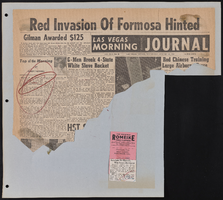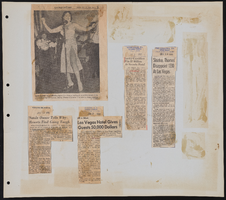Search the Special Collections and Archives Portal
Search Results
William Geagley Collection on Nuclear Safety
Identifier
Abstract
The William Geagley Collection on Nuclear Safety contains government publications, memoranda, and pamphlets about counteracting nuclear contamination of food supplies from 1951 to 1960. The materials primarily document Geagley’s oversight of the development of food safety contingency plans for the Michigan Department of Agriculture. The materials also contain information relating to the Nevada Test Site’s plans for Operation Plumbbob, atmospheric and underground nuclear tests held in 1957 in Nevada.
Archival Collection
Edgar Flores (Nevada Legislature, Assemblyman) oral history interview conducted by Magdalena Martinez and Facundo Bentancourt: transcript
Date
Archival Collection
Description
From the Lincy Institute "Perspectives from the COVID-19 Pandemic" Oral History Project (MS-01178) -- Elected official interviews file.
Text

Eloiza B. Martinez oral history interview: transcript
Date
Archival Collection
Description
Oral history interview with Eloiza B. Martinez conducted by Maribel Estrada Calderón on October 10, 2018 for the Latinx Voices of Southern Nevada Oral History Project. Martinez discusses the career preparedness she took while working for Commercial Credit Corporation and studying with Mayor Oscar Goodman. She then describes her first impressions of Las Vegas, Nevada and about her community involvement. Martinez then discusses her work at Wells Fargo as loan officer and assistant vice president, and talks about discrimination in the workplace and in the neighborhood where she grew up.
Text
Katherine A. Spilde Papers on Native American Gaming
Identifier
Abstract
The Katherine A. Spilde Papers on Native American Gaming include materials collected by anthropologist Katherine Spilde about Native American gaming and the greater gaming industry. The materials date from 1789 to 2015, with the bulk of materials dating from 1995 to 2010. Materials dating from the eighteenth and nineteenth centuries are reproductions of key court opinions and treaties concerning Native American rights and sovereignty. The majority of the materials document Native American gaming following the passage of the 1988 Indian Gaming Regulatory Act (IGRA). The papers detail Native American gaming enterprises both on and off reservations, the socioeconomic impact of gaming, and the legislative history of Native American gaming in the United States. The papers include research and subject files created by Dr. Spilde during her employment with the National Gambling Impact Study Commission (NGISC), the National Indian Gaming Association (NIGA), and the Harvard Project on American Indian Economic Development (HPAIED). The collection includes socioeconomic reports; testimonies; correspondence; memos; press releases; photographs; audiovisual materials; promotional materials from casinos and tourist attractions; brochures; fact sheets; summaries; booklets; pamphlets; advertisements; tourism materials; journal articles; legal briefs; legislative documents; court opinions; Dr. Spilde’s notes; presentations; packets, agenda, schedules, and itineraries from conferences; periodicals; Native American and community newspapers; and newspaper articles. The collection includes materials about over one hundred federally recognized Native American nations. Also included are materials that document the socioeconomic impact of gaming, the international gaming industry, criminal activities related to gaming, advertising about gaming and casinos, lotteries, internet gaming, compulsive gambling, and bankruptcy as a result of gambling.
Archival Collection
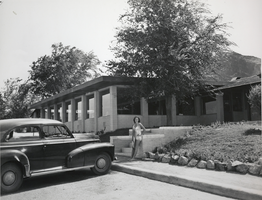
Photograph of a woman posing in front of the Lake Mead Lodge, Nevada, circa 1940s to 1950s
Date
Archival Collection
Description
Image
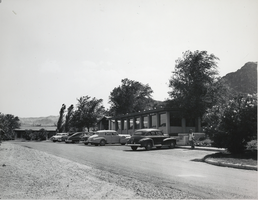
Photograph of the front exterior of the Lake Mead Lodge, Nevada, circa 1940s to 1950s
Date
Archival Collection
Description
Image
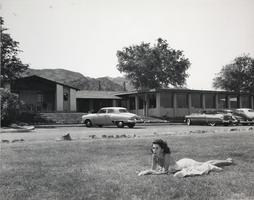
Photograph of the front entrance of the Lake Mead Lodge, Nevada, circa 1940s to 1950s
Date
Archival Collection
Description
Image
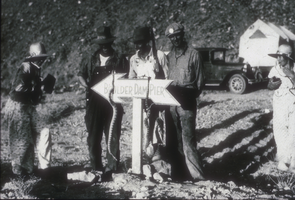
Slide of people at the Hoover Dam pier sign, April 18, 1931
Date
Archival Collection
Description
Image

